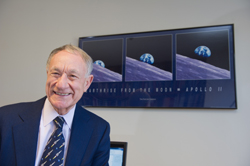Class of ’25 College of Law Graduate to Be Inducted Into the U.S. Olympic Hall Of Fame
A runner for most of her life, Marla Runyan L’25 crossed yet another finish line when she walked the stage in May to accept her diploma from the College of Law. While this was quite an achievement, she is no…


 As a graduate student at Columbia University in the early 1960s, Henry Lambright immersed himself in government and political science studies only to discover that his true passion lay a bit farther afield—in outer space. Not surprising, perhaps, at a time when NASA’s full-throttled effort to beat the Soviet Union to the moon had become something of a patriotic obsession and starry-eyed youngsters everywhere dreamed of growing up to be astronauts.
As a graduate student at Columbia University in the early 1960s, Henry Lambright immersed himself in government and political science studies only to discover that his true passion lay a bit farther afield—in outer space. Not surprising, perhaps, at a time when NASA’s full-throttled effort to beat the Soviet Union to the moon had become something of a patriotic obsession and starry-eyed youngsters everywhere dreamed of growing up to be astronauts.